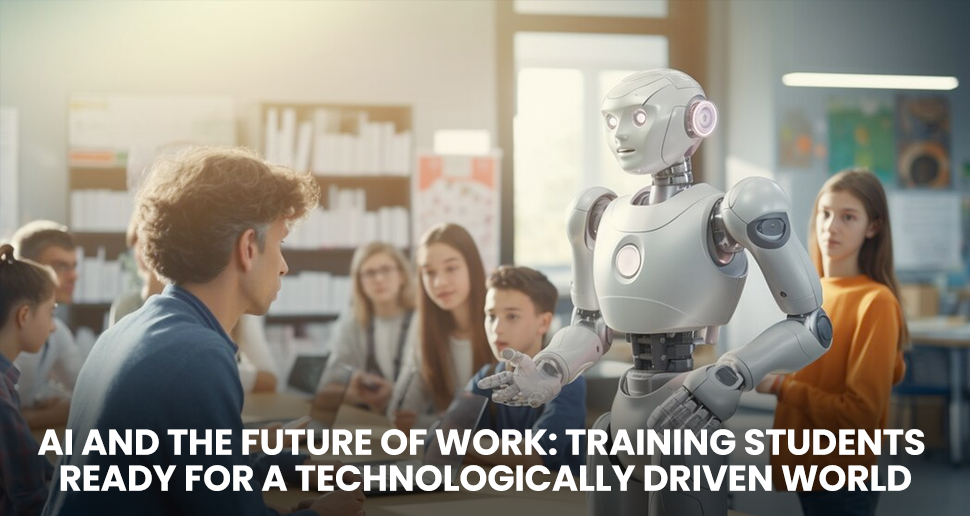Technology has already come to play a very significant role in today’s fast-moving world, more so through Artificial Intelligence. This ranges from automation to high-level decision-making in most of the industries and job markets around the world. As we move further into this technologically driven era, it’s essential to prepare students with the challenges and opportunities that lie within. AI is becoming an intrinsic part of education in Australia, if not more so, to prepare children for a future workforce. The blog explains how Artificial Intelligence services can be integrated into many diverse subjects, examines a shifting job landscape, and explains the kinds of skills required in AI-related careers.
Integration of AI into Different Subjects
Artificial intelligence is coming to education in a big way. This new wave of change will change forever how students learn and interact with information. AI-powered digital learning tools come to the front line in innovation, redefining what the traditional classroom experience looks like in Australian education and personalized learning experiences tailored to a student’s pace and needs.
For example, AI in subjects such as mathematics will help learners to solve problems more effectively. By analyzing the progress of a learner, AI identifies where exactly he/she struggles and gives some exercises that would make the student improve on it. In language classes, AI chatbots can simulate conversations with native speakers to help students practice their skill in languages.
Moreover, AI has no limitation on subjects being taught. It is fit for all fields of study, hence highly interactive to learn. For example, in history class, AI can come up with the reproduction of a man with simulations to historical events that pupils can go through and experience. In science, AI can help with simulated experiments that help the learner understand the concept of science.
Finally, AI will help in administration, for example, checking marks and attendance by students. Teachers, therefore, will have more time for meaningful contact with children. Artificial intelligence companies in Australia take the lead in these inventions and innovations to ensure that education goes in tandem with technology.
Understanding the Changing Nature of Jobs
The future of work is going to be shaped by AI, so it becomes very important to know how the nature of jobs is changing and, hence, for the preparation of students. The single biggest expectation is that it will take over a very large number of routine tasks as AI advances. Though some jobs may be lost, new opportunities are on the anvil in AI-aligned domains.
AI is being used in health sector-related industries, financing, and manufacturing to increase effectiveness in operations and the resulting accuracy. For example, in the health industry, AI-based tools aid doctors in diagnosing diseases and framing treatment plans that are personalized. In finance, it detects fraudulent transactions and streamlines investment; in manufacturing, AI-driven robots get complex tasks done with precision and speed.
However, this is also a shift where traditional jobs will require new kinds of skills. For example, a factory worker will need to know how to use and service AI-based machines. A financial analyst will need insight into how AI algorithms work to understand data well.
Moreover, the changing job landscape underlines the role of creativity, critical thinking, and problem-solving skills in a learner’s profile. While artificial intelligence can accommodate routine tasks, AI still does not replace the complex decision-making and innovative capacity of human beings.
Identifying the talent sets necessary for AI-related careers
As AI becomes infused through industries, demand for professionals with AI-related skills is on the rise. The bottom line should be to prepare the student for that kind of career, identifying the skills to equip them to manage it.
The most important skills would be a strong mathematical and computer science background. AI is very heavy on algorithms and data, so students will definitely need a pretty good grip on the subject. Infusions of courses on coding, data analytics, and machine learning are slowly becoming rampant in a ship, availing the skills the students need for AI and AI-related careers.
Besides technical skills, students have to build up soft skills like communication, collaboration, and adaptability. Quite often, AI projects are a form of teamwork; hence, it becomes necessary to have very good communication skills among fellow colleagues coming from diverse backgrounds. Moreover, with AI technology still undergoing evolution, students have to be adaptable and willing to learn new skills so that they are updated with whatever happens in the field. Other important aspects of careers related to AI are the ethical considerations.
With the rise of AI, a lot of concerns grow over issues such as privacy, bias, and societal effects. Students should be aware of these ethical issues and learn to develop AI solutions that are fair, transparent, and responsible. AI-driven digital learning tools are very important in aiding students in this skill set. Their use of AI in personalizing their learning will afford students the opportunity to focus on areas in need of improvement. It would, therefore, avail them of the skills deemed necessary for working environments. Coupled with that, AI would go a long way in assisting these students to keep up with the current trends and advancements in AI technologies and thus progress with time.
Conclusion
AI and chatgpt ai in australian education revolutionizes industries and job markets and brings the relevance of preparing students for a future of jobs. It looks at the integration of AI into the different subjects to understand how the job is changing and to identify the required competences for careers in AI. The institutions of education, in collaboration with AI companies all over Australia, including Seaford, shall focus on preparing the students for challenges born out of opportunities in a world led by technology. We will be able to march ahead in such a manner that individualized learning, technical skills, and issues of morality can be dealt with to let the next generation measure up to the world ruled by AI.





